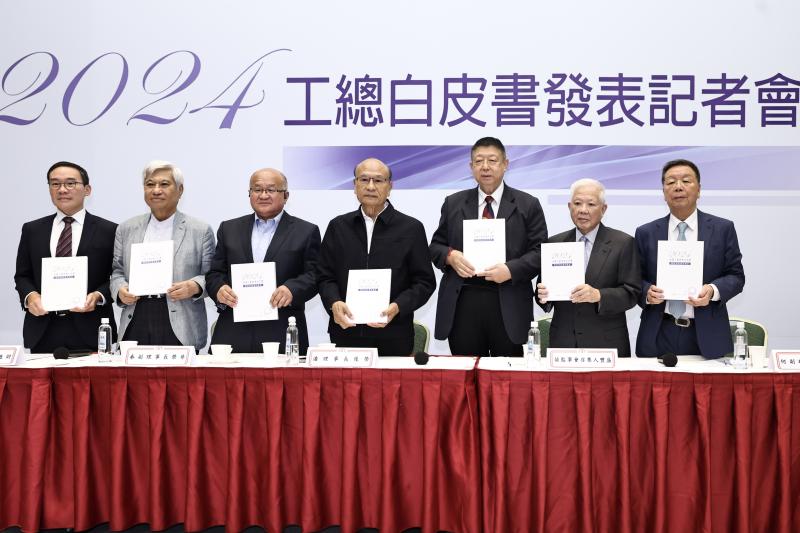The Taipei-based Chinese National Federation of Industries (CNFI, 全國工業總會) released its annual white paper yesterday, which outlined four main challenges facing Taiwan's industries and raised seven key strategies to the government for boosting industrial competitiveness.
According to the white paper, the seven key strategies included restructuring an industrial ecosystem that supports Taiwan's socioeconomic development, enhancing infrastructure resilience, establishing Taiwan as a new hub for the global supply chain, and rebuilding a peaceful cross-strait dynamic.
They also included laying the groundwork for artificial intelligence (AI), reviewing immigration and talent recruitment systems, and creating a fair, feasible carbon fee system that supports industrial competitiveness.

Photo: CNA
CNFI vice chairman Dennis Chen (陳進財) outlined four challenges facing Taiwan's industrial development at a press conference yesterday. The challenges included the growing imbalance between Taiwan's industries as the information and communication technology sector rapidly develops while the metal, electrical, and consumer chemistry industries lag in growth.
Another challenge is the lack of labor and talent, which Chen said is even more serious than water and electricity supplies.
However, Chen also said that there is an urgent need to address energy concerns to prevent the hindering of the AI industry's progress, given the energy-intensive nature of AI development.
The third challenge arises from geopolitical factors impacting businesses' cross-strait and global operations, particularly China's suspension of tariff reductions on goods on the early harvest list under the Cross-Strait Economic Cooperation Framework Agreement and US export controls on high-tech products for national security reasons, Chen said.
The fourth challenge is implementing adequate supporting measures for Taiwan's impending carbon fees. Chen said a lack of these may lead to Taiwan failing to reduce emissions or unfair competition.
Chen urged government efforts to support the transformation of traditional industries, fostering a startup-friendly environment and reforming outdated tax systems to enable an effective industrial ecosystem.
He said that after the value-added business tax was established in 1986, taxes including commodity and stamp tax should have been abolished. However, while the CNFI has made related recommendations for several years, the Ministry of Finance has only stated that further study is needed, he said.
Given the government's annual tax revenue surplus in recent years, Chen argued that the government should not ignore such proposals.
Meanwhile, CNFI chairman Pan Chun-jung (潘俊榮) said he is planning to meet with President William Lai (賴清德) next month and that the federation will cooperate with the government to address challenges facing Taiwan's industries.
Pan also expressed hope that the government will prioritize addressing the pressing shortage of workers and skilled talent in Taiwan.

CAUTIOUS RECOVERY: While the manufacturing sector returned to growth amid the US-China trade truce, firms remain wary as uncertainty clouds the outlook, the CIER said The local manufacturing sector returned to expansion last month, as the official purchasing managers’ index (PMI) rose 2.1 points to 51.0, driven by a temporary easing in US-China trade tensions, the Chung-Hua Institution for Economic Research (CIER, 中華經濟研究院) said yesterday. The PMI gauges the health of the manufacturing industry, with readings above 50 indicating expansion and those below 50 signaling contraction. “Firms are not as pessimistic as they were in April, but they remain far from optimistic,” CIER president Lien Hsien-ming (連賢明) said at a news conference. The full impact of US tariff decisions is unlikely to become clear until later this month

With an approval rating of just two percent, Peruvian President Dina Boluarte might be the world’s most unpopular leader, according to pollsters. Protests greeted her rise to power 29 months ago, and have marked her entire term — joined by assorted scandals, investigations, controversies and a surge in gang violence. The 63-year-old is the target of a dozen probes, including for her alleged failure to declare gifts of luxury jewels and watches, a scandal inevitably dubbed “Rolexgate.” She is also under the microscope for a two-week undeclared absence for nose surgery — which she insists was medical, not cosmetic — and is

GROWING CONCERN: Some senior Trump administration officials opposed the UAE expansion over fears that another TSMC project could jeopardize its US investment Taiwan Semiconductor Manufacturing Co (TSMC, 台積電) is evaluating building an advanced production facility in the United Arab Emirates (UAE) and has discussed the possibility with officials in US President Donald Trump’s administration, people familiar with the matter said, in a potentially major bet on the Middle East that would only come to fruition with Washington’s approval. The company has had multiple meetings in the past few months with US Special Envoy to the Middle East Steve Witkoff and officials from MGX, an influential investment vehicle overseen by the UAE president’s brother, the people said. The conversations are a continuation of talks that

Alchip Technologies Ltd (世芯), an application-specific integrated circuit (ASIC) designer specializing in artificial-intelligence (AI) chips, yesterday said that small-volume production of 3-nanometer (nm) chips for a key customer is on track to start by the end of this year, dismissing speculation about delays in producing advanced chips. As Alchip is transitioning from 7-nanometer and 5-nanometer process technology to 3 nanometers, investors and shareholders have been closely monitoring whether the company is navigating through such transition smoothly. “We are proceeding well in [building] this generation [of chips]. It appears to me that no revision will be required. We have achieved success in designing